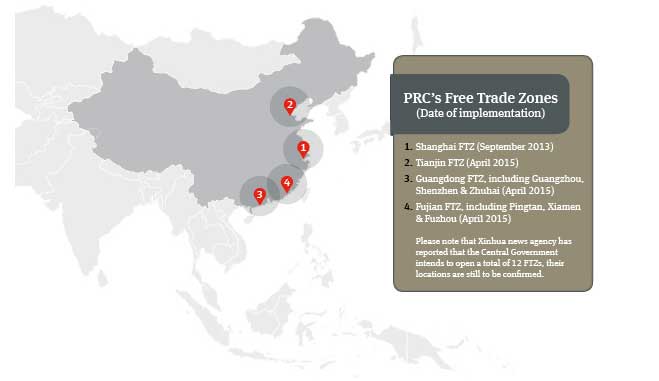
Publication
Insurance regulation in Asia Pacific
Ten things to know about insurance regulation in 19 countries.


Global | Publication | July 2016
The rapid growth of the aviation industry in the People’s Republic of China (“PRC”) over the past decade has been led predominantly by the local airlines and supported by the National People’s Congress (“NPC”). Evidence of this influence can be seen in:
On the back of this, PRC-based lessors have increased their involvement in this industry and foreign-based lessors and financiers have sought to build relationships with PRC airlines.
There are two types of PRC-based lessors:
In 2010, CBRC permitted the establishment by CBRC regulated lessors of special purpose vehicles with limited liability company status (“SPVs”) to carry out aircraft leasing transactions. CBRC ruled that SPVs could be established in designated locations within China. Since then, a significant number of SPVs have been incorporated by leading PRC-based leasing companies such as ICBCFL, CDB Leasing, Minsheng Leasing and CCB Financial Leasing to act as lessors of aircraft. This scheme has tended to focus upon the PRC-based lessors.
Starting from 29th September 2013, MOFCOM regulated lessors were also permitted to set up SPVs for aircraft leasing. This coincided with the launch of the China (Shanghai) Pilot Free Trade Zone (“Shanghai FTZ”) for the aviation industry. The plans for the Shanghai FTZ stated that any kind of lessor would be allowed and encouraged through certain benefits (see below) to set up SPVs in the Shanghai FTZ to carry out a domestic and international aircraft leasing business. The NPC considered that more capacity was needed for aircraft leasing in PRC to support the growth of PRC airlines. This has been facilitated by an online platform introduced by the Shanghai FTZ administrative commission. Since then, an increasing number of foreign-based lessors have sought to establish a presence in the free trade zones (“FTZs”) through MOFCOM to pass on the same commercial benefits to the PRC airlines.
Since establishing the Shanghai FTZ, the PRC has sought to expand the geographical spread of FTZs to include Tianjin, Guangdong province and Fujian province (see Figure 1). Incorporation within them offers advantages to the relevant SPV and PRC airlines, including:

Both the CBRC and MOFCOM regulated lessors are allowed to establish SPVs in FTZs.
A CBRC regulated financial leasing company needs only for its parent leasing company to get a “one off” approval from CBRC to establish an FTZ SPV. Conversely, each time a MOFCOM regulated financial leasing company wants to set up an FTZ SPV it needs to seek approval by the relevant FTZ administrative commission. The following procedure applies to a MOFCOM regulated lessor:
The tax incentives available to an SPV incorporated in a FTZ need to be negotiated on a case-by-case basis and a memorandum of understanding needs to be entered into with the specific tax authority governing a particular FTZ. Also, the State Administration of Foreign Exchange (“SAFE”) requirements must be met. SAFE no longer requires entities to seek USD foreign exchange permission to remit offshore in respect of operating lease payments but it does still require the registration for finance lease payments. Since April 2015 it has been necessary to secure the import approval of the National Development and Reform Commission (“NDRC”).
As part of the security package which overseas lenders negotiate when lending to SPVs, it is common for the lenders to request a local law share pledge or charge granted by the shareholders in its favour over the shares of the borrowing entity. In Chinese law this is a valid and workable clause to add but in the case of an FTZ SPV, it would need approval of the local authority in the FTZ in respect of MOFCOM regulated lessors and by CBRC for CBRC regulated lessors. Such approvals cannot be obtained when the security interest is granted and only when enforcement takes place and there is to be an actual transfer of the shares.
To date, there have been no enforcement cases so it is unclear as to whether such approvals would be granted. The expectation of local Chinese practitioners is that FTZ authorities would grant approval.
In regard to CBRC, by virtue of how it seeks to regulate, such a clause may not be acceptable. CBRC approves the incorporation of an FTZ SPV by the CBRC regulated lessor under a special decree issued by the Chinese government. It retains an interest in the FTZ SPV as the overseeing body of non-banking financial institutions and may want to ensure that such SPV stays under its remit and, consequently, that the shareholding stays in China.
One possible alternative for overseas lenders to seeking CBRC approval might be to ensure that the share pledge is granted to a financial institution which is also under the supervision of CBRC (i.e. a local entity as the security trustee). The concern that local practitioners have with such an option is that CBRC will look through the security trustee to the ultimate creditors and still not provide the necessary approval. This has yet to be tested but the spirit of the PRC government’s decree is to protect these FTZ SPVs as much as possible so it would be unlikely that CBRC approval would be forthcoming.
Although this has yet to be tested, local practitioners are of the view that the CBRC will play a significant role in the any insolvency process and the local FTZ authorities will take more of a backseat.
If an FTZ SPV is heading towards insolvency, it is most likely because the parent is going in the same direction. It is thought that where the parent is regarded as a systemically important national financial institution, then the CBRC via the People’s Bank of China (“PBOC”) and MOFCOM will provide liquidity to prevent insolvency.
Following such a bailout the relevant PRC authorities may require the restructuring of the parent such as selling off non-core business/assets. It may be possible that the CBRC or other relevant PRC authorities would support a foreign company taking control of the shares in the FTZ SPV. Alternatively, the relevant Chinese authorities may specify that the business remains as is and prevent a foreign company taking control of the shares in an FTZ SPV.
An increasing number of lessors, both domestic and foreign, are seeking to incorporate FTZ SPVs and pass on the benefits to PRC airlines. Lessors which have embraced and financiers which have supported importing aircraft through an FTZ SPV have been able to successfully tender for an increasing mandate in the fastest growing aviation market in the world.

Publication
Ten things to know about insurance regulation in 19 countries.

Event
The Insurathon is a Norton Rose Fulbright event which fosters technological advancements and innovation in the insurance sector, now in its eighth year.

Publication
A recent decision made by the UK's Advertising Standards Authority (ASA) brings into sharp relief the challenges for airlines to strike a balance between marketing their sustainability efforts in an understandable and compelling way, whilst avoiding criticism for “greenwashing”.
Subscribe and stay up to date with the latest legal news, information and events . . .
© Norton Rose Fulbright LLP 2025